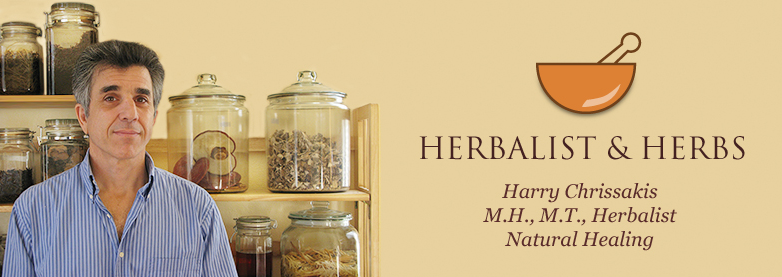SLEEP DEBT/SLEEP DISORDER ( A piece in the puzzle of modern diseases)
by Harry Chrissakis Herbalist, M.H. Natural Healing
HERBALIST AND HERBS
A hundred years ago all the major killers were infectious
diseases. Pneumonia, tuberculosis, influenza. These are
relatively fast, germ driven disorders. The advent of antibiotics
changed all this (penicillin 1941).
Now the diseases that take people out are long term in developing and
constitutional in nature. Heart attack, cancer and stroke may
appear quick, but often have been in the works a long time
(generally decades).
A number of influences that shaped these problems have
been brought to light. Poor diet, environmental toxicity
and stress. There is however one area that has been grossly
overlooked; lack of good quality sleep. This is particularly
true in Go Go America.
Now let’s watch a short introductory video:
In 1900 the average amount of sleep was about 9 hours per
night, now it is less than 7. Not only is it shorter but often
it does not get deep and restful.
Many important physiological process occur in sleep;
from the repair and rebuilding of damaged tissue, to the
detoxification of potentially damaging substances that we
ingest (PCBs, Heavy metals) or naturally produce (the
more potent hormones).
Without prolonged restful sleep these processes are incomplete
or simply do not occur.
Think of this alteration in natural function going on for a
long time; the body trying to catch up but always in a compromised
position. The neural and hormonal systems which
play a key role in maintaining balance (Homeostasis) are
constantly struggling. Eventually they become altered and
instead of maintaining strength and integrity they begin to
promote problems or at least inclinations to problems.
A well trained and experienced health care provider does
not just deal with the problems presented by the patient,
but tries to change the direction of a developing constitutional
disorder before it becomes a full blown disease.
Getting people to sleep well is one of the principals of
healing and recovery.
Following are some reasons for poor or broken sleep.
1) Eating too late. Large dinners late at night put a big
stress on the liver. When I am working with sleep disorders
the first thing I try to do is to get the person to change their
eating patterns, with emphasis on a good breakfast (approximately
50% of Americans do not eat breakfast) and lunch
followed by a light dinner – no late night snacking
Over stimulation from electric lights, computers or
TV late into the night (includes late night reading). This
type of light has a big effect on melatonin production.
Melatonin is a pineal hormone that establishes circadian
rhythms (cycles of waking and sleeping)
3) Caffeine can be a problem. A cup of coffee supplies
about 150 – 175 mg of caffeine ( a good doses) Tea is about
half that. The effect of caffeine will last in our systems for
about six hours.
4) Alcohol. In Chinese medicine alcohol is considered a
warm to hot substance that moves and activates blood and
Chi (energy). Some people cannot handle even small
amounts of alcohol at night. The usual pattern is that they
fall asleep but wake up later and have a hard time going
back to sleep.
5) Sub clinical inflammatory states that exist in our bodies
due to poor diet, stress, past illnesses, overworking, etc.
Long term these things set up patterns in the body that are
kind of hot and hyper undermining our ability to sleep
properly.
6) This one may sound a bit strange but hard evening
workouts can over stimulate some people. In this case
switching to morning workouts is beneficial.
Herbs and supplements can help reestablish proper
rhythm of sleeping
Skullcap tea. This herb should only be steeped, not boiled
and it makes a poor quality tincture. Bedtime. 1 teaspoon
steeped in 8oz of boiled water. Let stand covered for 20
minutes – Drink 2 – 4oz.
Hops as tea (2 to 4 oz.) or tincture (40 drops is a good
dose) before bedtime.
Melatonin. Range of use to help sleep is .5 mg up to 5 mg.
Sublingual tablets are fast acting
Sedatives are not the way to go and should be last resort.
The body simply does not go into the deeper layers of
sleep under the influence of sedatives.
Harry Chrissakis Herbalist, M.H., Natural Healing. (530) 933-8244
contact@herbalist-herbs.com
